Renewable Energy
Renewable energy is energy that is collected from renewable resources, which are naturally replenished on a human timescale, such as sunlight, wind, rain, tides, waves, and geothermal heat. This type of energy is considered to be environmentally friendly and sustainable, as it has a minimal impact on the environment compared to non-renewable sources like fossil fuels.
Types of Renewable Energy:
- Solar Energy: Energy obtained from the sun's radiation, which can be converted into electricity using solar panels or used for heating purposes.
- Wind Energy: Energy harnessed from the power of the wind using wind turbines to generate electricity.
- Hydropower: Energy derived from the gravitational force of falling or flowing water, which is captured and converted into electricity through hydroelectric power plants.
- Geothermal Energy: Energy generated from the heat stored beneath the Earth's surface, usually in the form of hot water or steam, which can be used for heating or to generate electricity.
- Biomass Energy: Energy produced from organic materials such as wood, agricultural residues, and waste, which can be burned or converted into biofuels for heating or electricity generation.
Advantages of Renewable Energy:
- Reduction of greenhouse gas emissions and air pollution
- Limitation of dependence on finite fossil fuel reserves
- Promotion of energy security and independence
- Creation of job opportunities in the renewable energy sector
- Contribution to sustainable development and environmental preservation
Study Guide:
To effectively study the topic of renewable energy, consider the following key points:
- Understand the principles and sources of renewable energy, including solar, wind, hydropower, geothermal, and biomass.
- Explore the technologies used to harness renewable energy, such as solar panels, wind turbines, hydroelectric dams, geothermal power plants, and biomass conversion systems.
- Examine the environmental and economic benefits of transitioning to renewable energy sources compared to non-renewable alternatives.
- Analyze the potential challenges and limitations associated with the widespread adoption of renewable energy, including intermittency, energy storage, and infrastructure requirements.
- Investigate the global trends and policies related to renewable energy deployment, including government incentives, carbon pricing, and international agreements.
By mastering these concepts and principles, you will develop a comprehensive understanding of renewable energy and its significance in the context of sustainable energy production and environmental stewardship.
Good luck with your studies!
.◂Science Worksheets and Study Guides Seventh Grade. Photosynthesis and Respiration
Worksheet/Answer key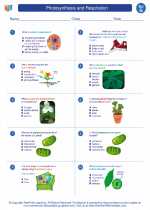 Photosynthesis and Respiration
Photosynthesis and Respiration  Worksheet/Answer key
Worksheet/Answer key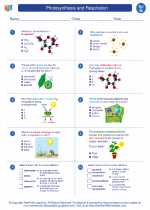 Photosynthesis and Respiration
Photosynthesis and Respiration  Worksheet/Answer key
Worksheet/Answer key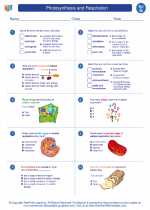 Photosynthesis and Respiration
Photosynthesis and Respiration  Vocabulary/Answer key
Vocabulary/Answer key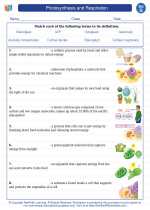 Photosynthesis and Respiration
Photosynthesis and Respiration  Vocabulary/Answer key
Vocabulary/Answer key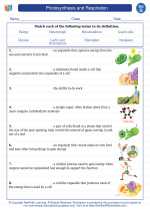 Photosynthesis and Respiration
Photosynthesis and Respiration  Vocabulary/Answer key
Vocabulary/Answer key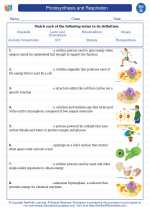 Photosynthesis and Respiration
Photosynthesis and Respiration 

 Worksheet/Answer key
Worksheet/Answer key
 Worksheet/Answer key
Worksheet/Answer key
 Vocabulary/Answer key
Vocabulary/Answer key
 Vocabulary/Answer key
Vocabulary/Answer key
 Vocabulary/Answer key
Vocabulary/Answer key

The resources above cover the following skills:
LIFE SCIENCE
Ecosystems: Interactions, Energy, and Dynamics
Examine the cycling of matter between abiotic and biotic parts of ecosystems to explain the flow of energy and the conservation of matter.
Generate a scientific explanation based on evidence for the role of photosynthesis and cellular respiration in the cycling of matter and flow of energy into and out of organisms.